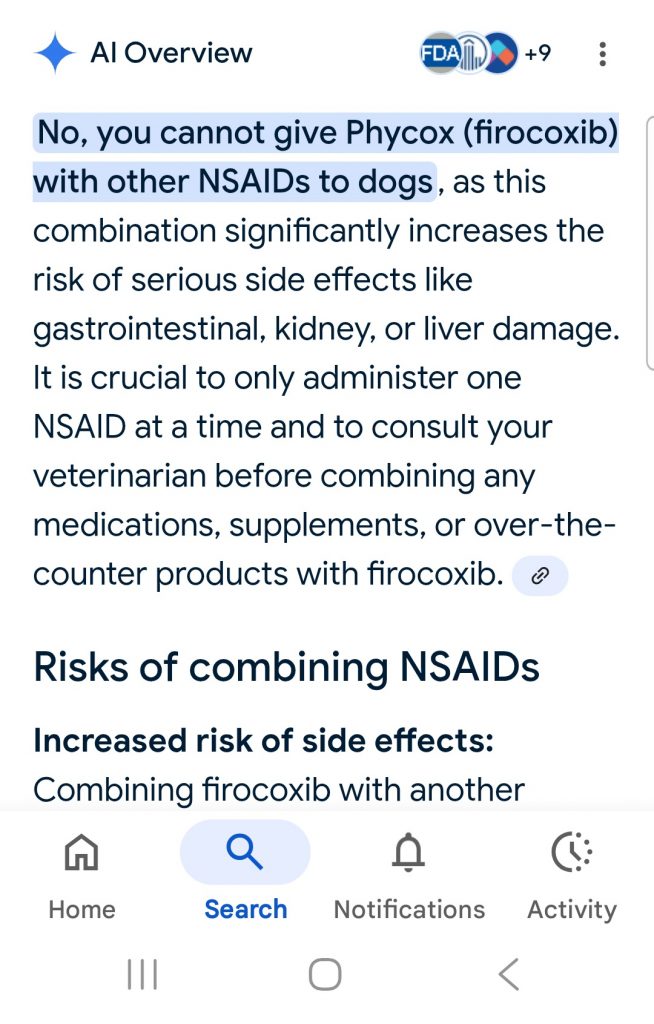
The other day, I had a new client come in with her senior dog for an annual exam. During the course of the examination, we went over the patient’s medications and supplements. Because the patient was taking non-steroidal anti-inflammatories (NSAIDs) on a regular basis, we ran screening lab work to make sure there were no significant abnormalities. This is particularly important as dogs as a species are sensitive to the side effects of NSAIDs, which can include GI upset and stomach ulcers, as well as liver and kidney issues.
My client mentioned that in addition to giving her dog carprofen (Rimadyl), she was also giving a joint supplement called Phycox. While there is nothing wrong with Phycox in and of itself–it’s a great supplement made by Dechra and I am considering giving it to my senior dog myself. Phycox has a combination of bioflavonids, tumeric, grape seed extrac, MSM, glucosamine and more. It is the only joint supplement that contains phycocyanin, which the Dechra website describes as “a natural anti-oxidant with powerful free radical scavenging properties. Free radicals can cause cellular damage and inflammation.”
But when the product was first launched,I seemed to recall that it was not a joint supplement that should be given in conjunction with NSAIDs. Because my patient was taking carprofen daily, I thought it wise to check to be sure that it was safe to use with NSAIDs. And so I did what most people do: I looked it up on the internet.
Whenever I do an internet search these days, I try to remember to add -ai to my search. This eliminates the AI summary at the top of the page, and returns your search to how the internet used to be in pre-AI days. At least, it does for now. I’m sure Google, Microsoft, Meta, and all the other major players in AI will figure out how to disable our work-arounds. But for now, this is what I do.
Only this time, I forgot to add “-ai” to my search. To my surprise, this is what the AI generated summary gave me:

Whoa! Phycox is NOT firocoxib!! Firocoxib is the generic name (or drug name) of the NSAID known as Previcox. These are not the same products! AI conflated the two products. The information given here is incorrect. Now, in this instance, no harm was done because having incorrectly labeled Phycox as another NSAID, AI correctly stated that you should not mix NSAIDs. But what if the opposite had happened? What if someone looked up Previcox and got the information for the wrong product and safely assumed it could be given to a dog already taking another NSAID? Here’s the kicker: if not for the fact that I’m a veterinarian, I might not have known this information was wrong. Potentially fatally wrong.
Here’s the kicker: if not for the fact that I’m a veterinarian, I might not have known this information was wrong. Potentially fatally wrong.
Let’s set aside for a moment the fact that generative AI has been built on the creative and scientific works across the internet without giving credit or financial recompense to any of these creative efforts. Ignore too, the fact that data centers already use up a huge amount of electricity and water, and that every simple AI search (like the one I inadvertently created above) uses a significant amount of both. Now compound that by the millions of searches taking place every second, or the fact posing a complex question of AI massively increases its consumption of resources. I’ve often said the internet is a source of opinions, not facts. In the past, a discerning user could reference the source material and determine which they were getting. But AI is folding in the opinions with the facts and presenting them as fact. And you may not have the expert knowledge to know the difference. The more AI is used, the more the built in flaws–like the one in the search shown above–will become apparent. But only if you can recognize them.
But AI is folding in the opinions with the facts and presenting them as fact. And you may not have the expert knowledge to know the difference.
I ended up contacting Dechra and asking if Phycox could be used in conjunction with NSAIDs. The representative said that was a very good question, and that if a decision was made to use Phycox in conjunction with NSAIDs, it should only be done with informed consent, and that you should be extra vigilant in monitoring lab work for any liver or kidney issues, or signs of stomach ulcers. Which I took to mean, “I wouldn’t do that if I were you.”
You might be saying right now, what does it matter if AI conflated the two products? It still gave you the right answer. Believe me, it matters. Because a right answer that is only a guess could be the wrong answer next time. There’s a reason why on math tests, you’re expected to show how you came to the correct answer. Show your work, AI.